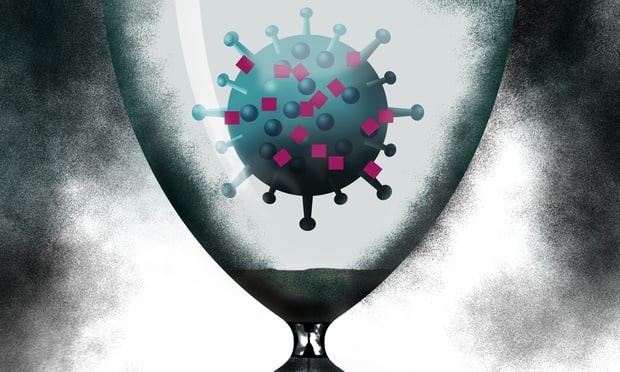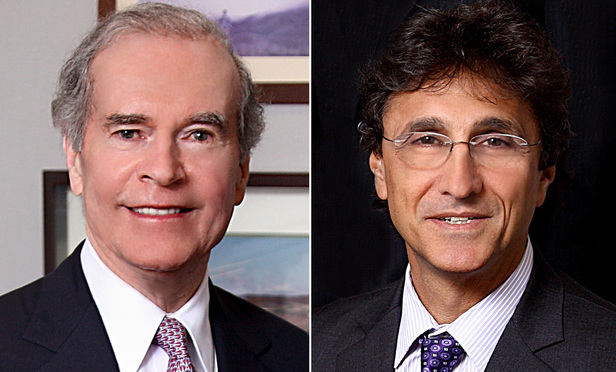Thomas A Moore

April 05, 2021 | New York Law Journal
Custom and Practice RevisitedIn this edition of their Medical Malpractice column, Thomas A. Moore and Matthew Gaier again address the issue of the admissibility of physicians' testimony as to their custom and practice, also known as habit evidence, in light of two recent Appellate Division decisions that provide new insights into the admissibility and applicability of such evidence.
By Thomas A. Moore and Matthew Gaier
15 minute read

February 01, 2021 | New York Law Journal
Liability for Transmitting COVID-19In their Medical Malpractice column, Thomas Moore and Matthew Gaier discuss both historical and modern precedent that helps answer the current issue during the COVID-19 pandemic as to whether people who infect others by engaging in negligent conduct may be held liable for the damage they cause.
By Thomas A. Moore and Matthew Gaier
14 minute read

November 30, 2020 | New York Law Journal
Consultation Reports in Physicians' Office RecordsTwenty-five years ago, this Medical Malpractice column concluded that a physician's entire office record, including the reports of consulting physicians and any findings or opinions contained therein, is admissible in evidence, so long as the material was kept in the regular course of the physician's business and was related to the diagnosis or treatment of the patient. Among the law discussed was 'Freeman v. Kirkland'. Another columnist recently concluded that 'Freeman' should no longer be followed. Thomas A. Moore and Matthew Gaier respectfully disagree with that conclusion in today's edition of their column.
By Thomas A. Moore and Matthew Gaier
13 minute read

October 05, 2020 | New York Law Journal
Liability of Referring PhysiciansIn this month's column, Medical Malpractice writers, Thomas A. Moore and Matthew Gaier, focus on the circumstances under which referring physicians may be held liable.
By Thomas A. Moore and Matthew Gaier
12 minute read

June 01, 2020 | New York Law Journal
Toll on Statutes of Limitations During the COVID-19 EmergencyIn their Medical Malpractice column, Thomas A. Moore and Matthew Gaier review pertinent executive orders that tolled statutes of limitations and analyze them in relation to the decisional law and prior executive orders issued in response to different emergencies.
By Thomas A. Moore and Matthew Gaier
12 minute read

April 06, 2020 | New York Law Journal
COVID-19 Legal Measures: An AddendumIn an addendum to a prior Medical Malpractice column, Thomas A. Moore and Matthew Gaier discuss the recently passed Emergency or Disaster Treatment Protection Act, Public Health Law Article 30-D, which codifies limited immunity for health care professionals and facilities during the pendency of the emergency declaration in place in New York as of March 7, 2020.
By Thomas A. Moore and Matthew Gaier
7 minute read

March 30, 2020 | New York Law Journal
COVID-19: Gov. Cuomo's Executive Order and Other Legal MeasuresIn their Medical Malpractice column, Thomas A. Moore and Matthew Gaier discuss some of the extraordinary measures being implemented in response to the COVID-19 outbreak.
By Thomas A. Moore and Matthew Gaier
12 minute read

February 03, 2020 | New York Law Journal
The Emergency Doctrine RevisitedThe theory behind the common law "emergency doctrine" is that a person in such a situation cannot reasonably be held to the same accuracy of judgment or conduct as someone who has an opportunity to reflect, even if the decision turns out to be wrong. The need for the emergency doctrine has been called into question in recent years based on principles of comparative negligence and the ability of juries to apportion fault. As Thomas A. Moore and Matthew Gaier discuss in this edition of their Medical Malpractice column, while some states have abolished the doctrine altogether, New York has not gone so far.
By Thomas A. Moore and Matthew Gaier
13 minute read

December 02, 2019 | New York Law Journal
Evidence of Custom and PracticeIn most medical malpractice actions, the defendants and other medical professionals who rendered the care and treatment that is the subject of the lawsuit do not have specific recollections of all of the events. Therefore, they often testify about their custom and practice. In their Medical Malpractice column, Thomas A. Moore and Matthew Gaier discuss a handful of significant decisions on the issue of the admissibility of evidence of habit or routine practice.
By Thomas A. Moore and Matthew Gaier
14 minute read

September 30, 2019 | New York Law Journal
New Approach to Pretreatment Agreements Held UnenforceableIn their Medical Malpractice column, Thomas A. Moore and Matthew Gaier discuss a recent trial level decision that addressed what appears to be a new approach by some health care providers to impede potential malpractice actions before rendering treatment. In a detailed analysis reminiscent of the decisions assessing exculpatory releases, Justice Sanford N. Burland concluded that the challenged provisions were unenforceable.
By Thomas A. Moore and Matthew Gaier
13 minute read
Trending Stories
- 1Judge Denies Sean Combs Third Bail Bid, Citing Community Safety
- 2Republican FTC Commissioner: 'The Time for Rulemaking by the Biden-Harris FTC Is Over'
- 3NY Appellate Panel Cites Student's Disciplinary History While Sending Negligence Claim Against School District to Trial
- 4A Meta DIG and Its Nvidia Implications
- 5Deception or Coercion? California Supreme Court Grants Review in Jailhouse Confession Case
More from ALM
- Legal Speak at General Counsel Conference East 2024: Match Group's Katie Dugan & Herrick's Carol Goodman 1 minute read
- Legal Speak at General Counsel Conference East 2024: Eric Wall, Executive VP, Syllo 1 minute read
- Legal Speak at General Counsel Conference East 2024: Virginia Griffith, Director of Business Development at OutsideGC 1 minute read



